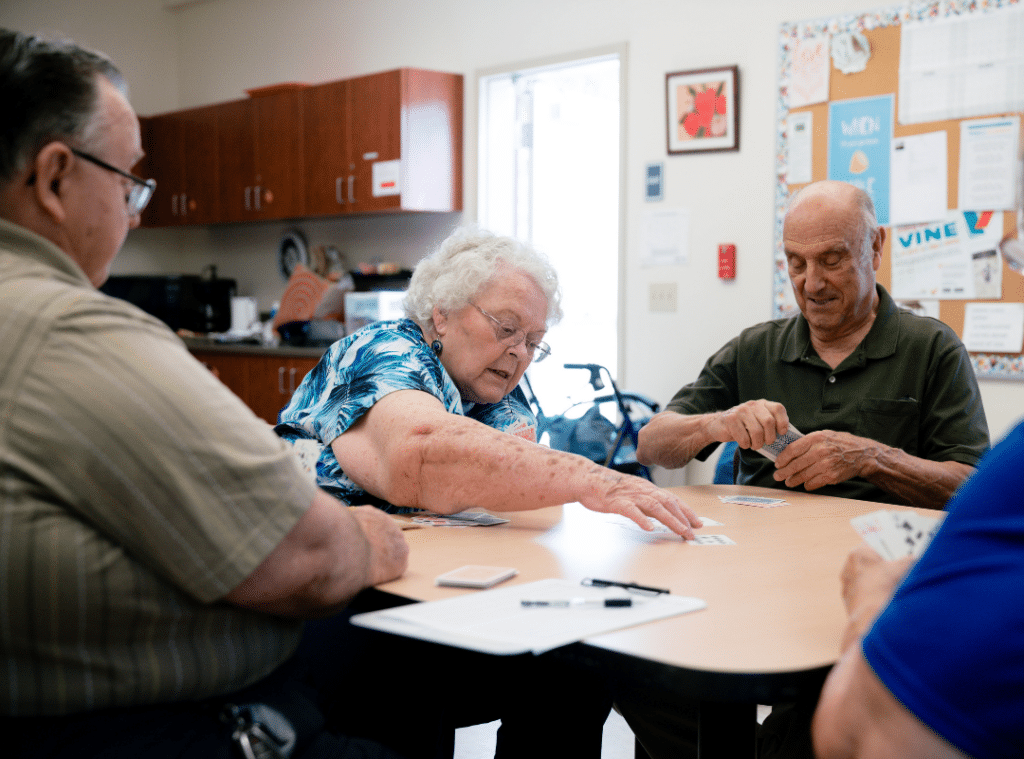Games for Elderly People That Spark Fun and Connection
At The Oaks at Paso Robles, we believe that laughter, connection, and mental sharpness shouldn’t fade with age—they should flourish. That’s where games for elderly people come in. From sparking smiles to strengthening memory, games create joy and togetherness among seniors. Whether it’s gathering around the table for cards or moving gently with a physical activity, every game offers a chance to grow closer, think sharper, and feel happier. These moments of fun are far more than entertainment—they’re essential for emotional and social wellness. Games can also break up the routine, bringing bursts of excitement to daily life. For residents in senior communities, that boost can make a meaningful difference. If you’re searching for new ways to help a loved one or resident feel more engaged and energized, start with play. Explore how simple activities, such as party games for senior citizens or group puzzles, can help build joy and connection at The Oaks.
Cognitive Power from Sit-Down Games for Senior Citizens
You don’t have to stand to feel your mind in motion. Sit-down games for senior citizens are perfect for keeping the brain active without putting too much physical strain. Card games, trivia, and puzzles can significantly improve memory, attention, and problem-solving skills. Playing these games regularly encourages mental flexibility and can even slow cognitive decline. A favorite among many at The Oaks is a bridge or a simple crossword challenge, each offering layers of strategy and learning. Plus, these games are inclusive, making them perfect for residents with mobility concerns who still want to stay mentally engaged. According to this Westmont Living article on memory games, mental stimulation through games can positively affect memory retention and decision-making.
Social Connections Through Party Games for Senior Citizens
When seniors gather for party games, laughter and connection naturally follow. These group activities help build bonds between residents, staff, and their families. Charades, trivia, or storytelling circles allow everyone to share experiences, triggering fond memories and building emotional closeness. These games aren’t just fun—they’re meaningful. They ease loneliness and bring smiles that last long after the game is over. Whether it’s a weekly gathering or a spontaneous session in the lounge, party games promote a lively and engaged environment. Westmont of Carmel Valley highlights how such social interaction can uplift mood and foster a sense of belonging.
Physical Games for Seniors Promote Energy and Mobility
A little movement can go a long way. Physical games for seniors help maintain strength, balance, and flexibility while also boosting mood. Gentle ball tosses, chair yoga with music, or simple dancing games are all great ways to encourage physical activity safely and enjoyably. These games provide light cardiovascular benefits and support motor skills, all while making participants laugh and move to the rhythm of fun. Even better, they’re adaptable to individual needs, making them a good fit for both active seniors and those who require seated options. Games like balloon volleyball or seated bowling offer the joy of physical activity without the pressure. The key is play, not performance.
Puzzles and Brain Games for Mental Sharpness
Games that challenge your thinking—like puzzles, Sudoku, or memory card games—can make a big difference in mental agility. These are favorite games for elderly people, whether in group or solo settings. Residents often gather at The Oaks to work on jigsaw puzzles together, chatting as they piece together a picture, one piece at a time. These activities support logic, spatial awareness, and even hand-eye coordination. They’re also deeply satisfying, giving players a sense of accomplishment. According to The Oaks at Nipomo, puzzles are not just pastimes—they’re tools for connection and cognition.
Games for the Elderly in Nursing Homes Build Belonging
In senior living communities like The Oaks, games for the elderly in nursing homes can be powerful tools for inclusion and connection. New residents might feel nervous or isolated, but something as simple as joining a bingo game or trivia night can quickly change that. These familiar games offer a gentle introduction to community life. They bring together individuals from different backgrounds, helping to create shared experiences and new friendships. Plus, they’re easy to learn, require minimal setup, and encourage laughter even among strangers. For those in memory care, modified versions of these games offer stimulation tailored to their needs, ensuring every resident can participate meaningfully.

Card Games Create Easy, Everyday Joy
Card games are a beloved staple in senior communities, offering a mix of strategy, memory, and fun. From classics like Go Fish to competitive rounds of Rummy or UNO, the simplicity and social nature of these games make them ideal games for elderly people. Oversized playing cards and easy-to-follow rules make it easy for everyone to join, regardless of their experience level. These games are often the center of group gatherings at The Oaks, encouraging laughter, friendly competition, and even a little light-hearted teasing. Plus, they’re an excellent way to mix generations when family visits. Find more indoor game ideas to try with loved ones.
Storytelling and Creative Games Spark Imagination
Not all games involve rules and points—some are about imagination and connection. Games like Story Cubes or collaborative storytelling build communication skills and creative thinking. These kinds of sit-down games for senior citizens give everyone a voice and invite players to share memories, jokes, or dreams in playful ways. At The Oaks, we love seeing the spark in residents’ eyes as they build stories together, strengthening friendships while celebrating each person’s creativity.
Games are more than just a pastime—they’re a bridge to joy, community, and wellness. Whether it’s sharing laughs over party games for senior citizens, staying active with physical games for seniors, or building community through games for the elderly in nursing homes, there’s something magical about gathering around for a game. At The Oaks at Paso Robles, we’ve seen firsthand how play can transform ordinary moments into extraordinary ones.
Want to experience the joy of senior living through play and connection? Schedule a tour today or call us at (805) 239-5851 to learn more.
Discover the level of care you or your family member requires. What Level of Care Do You Need?
Frequently Asked Questions
What games are good for senior citizens?
Games great for senior citizens include card games like Bridge or Rummy, board games like Scrabble or Monopoly, and puzzle games like Sudoku and crossword puzzles. These types of games help keep the mind sharp and provide a fun way to socialize. Digital games, such as brain training apps, can also be enjoyable and beneficial. The best games are those that match individual interests and physical ability.
What are some good activities for older adults?
Good activities for older adults include walking, gardening, and gentle exercises like yoga or tai chi. These activities promote physical health and can also be relaxing. Creative hobbies such as painting, knitting, or playing a musical instrument can help stimulate the mind and offer emotional satisfaction. Social activities, such as book clubs or community events, are also excellent for staying engaged.
What is the 20 Questions game for seniors?
The 20 Questions game is a simple and fun guessing game where one person thinks of something (a person, place, or thing), and others try to guess what it is by asking yes-or-no questions. Seniors often enjoy this game because it encourages critical thinking and conversation. It can be played anywhere and requires no equipment, making it easy to enjoy with friends or family. It’s especially great for memory stimulation and group interaction.
What are fun group activities for seniors?
Fun group activities for seniors include bingo, trivia games, group storytelling, and arts and crafts sessions. These types of activities promote socialization and a sense of community. Music sessions, dance classes, or even movie nights are also popular choices that bring joy and connection. The key is to choose inclusive activities that cater to different ability levels and interests.








